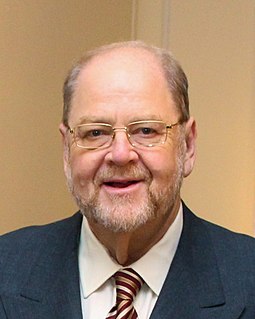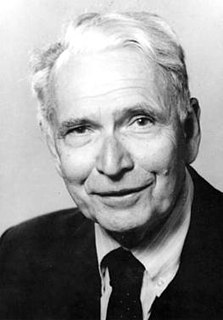A Quote by Kenneth R. Miller
Biology is far from understanding exactly how a single cell develops into a baby, but research suggests that human development can ultimately be explained in terms of biochemistry and molecular biology. Most scientists would make a similar statement about evolution.
Related Quotes
If belief in evolution is a requirement to be a real scientist, it’s interesting to consider a quote from Dr. Marc Kirschner, founding chair of the Department of Systems Biology at Harvard Medical School:
“In fact, over the last 100 years, almost all of biology has proceeded independent of evolution, except evolutionary biology itself. Molecular biology, biochemistry, physiology, have not taken evolution into account at all.
We know from astronomy that the universe had a beginning, from physics that the future is both open and unpredictable, from geology and paleontology that the whole of life has been a process of change and transformation. From biology we know that our tissues are not impenetrable reservoirs of vital magic, but a stunning matrix of complex wonders, ultimately explicable in terms of biochemistry and molecular biology. With such knowledge we can see, perhaps for the first time, why a Creator would have allowed our species to be fashioned by the process of evolution.
It is easy to make out three areas where scientists will be concentrating their efforts in the coming decades. One is in physics, where leading theorists are striving, with the help of experimentalists, to devise a single mathematical theory that embraces all the basic phenomena of matter and energy. The other two are in biology. Biologists-and the rest of us too-would like to know how the brain works and how a single cell, the fertilized egg cell, develops into an entire organism
It is now widely realized that nearly all the 'classical' problems of molecular biology have either been solved or will be solved in the next decade. The entry of large numbers of American and other biochemists into the field will ensure that all the chemical details of replication and transcription will be elucidated. Because of this, I have long felt that the future of molecular biology lies in the extension of research to other fields of biology, notably development and the nervous system.
The second half of the 20th century was a golden age of molecular biology, and it was one of the golden ages of the history of science. Molecular biology was so successful and made such a powerful alliance with the medical scientists that the two together just flourished. And they continue to flourish.
A paradigm shift is the best a scientist can hope for. Whenever I smell an opportunity like that, I go after it. You have a new discovery that something's working in a different way than you thought. And this is particularly true in molecular and cell biology, which is structural biology and has the least potential for controversy and partisanship among the biological scientists. You're dealing with a concrete object that's either there or not there.
The students of biodiversity, the ones we most need in science today, have an enormous task ahead of molecular biology and the medical scientists. Studying model species is a great idea, but we need to combine that with biodiversity studies and have those properly supported because of the contribution they can make to conservation biology, to agrobiology, to the attainment of a sustainable world.































